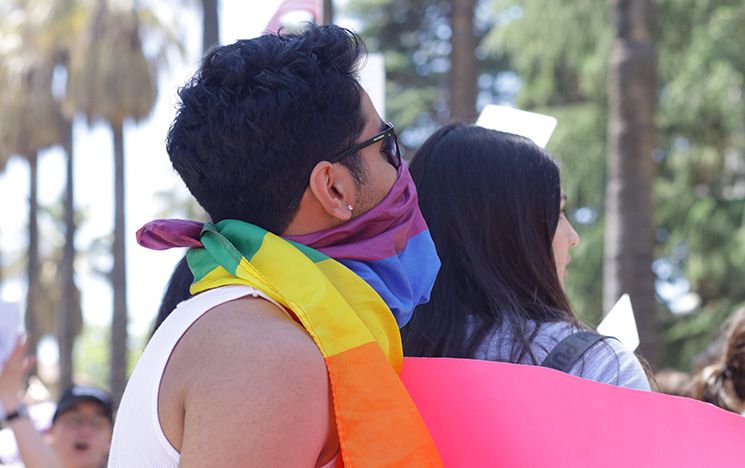Gender and sexuality
SCMR researchers are working to increase the visibility of how gender and sexuality impact migrants’ economic, legal, social and political experiences, including in relation to sexual orientation and gender identity-based persecution, forced migration and asylum-seeking. We have built up a critical mass of researchers working in this field.
 Protestors wrapped in a rainbow flag (Photo: Frazier, 2022)
Protestors wrapped in a rainbow flag (Photo: Frazier, 2022)
Gender and sexuality
Read more below about selected current and past projects on migration, gender and sexuality.
- Gender and Sexuality in Migration Research (GenSeM)
GenSeM is a standing committee of the IMISCOE network (see SCMR partnerships page) coordinated by SCMR members Sarah Scuzzarello and Laura Moroşanu. Members include IMISCOE-affiliated scholars whose research focuses on the areas of gender, sexuality and migration. GenSeM creates an infrastructure that gives voice and visibility to the needs of academics studying in these fields; supports relevant publications; promotes communication among specialists; and organises expert meetings.
GenSeM has a very active research community. The network holds a regular Migration Dialogue Seminar series (online), featuring leading scholars in the field discussing their recent work and publications, and supports doctoral researchers working on related topics.
Read more on the IMISCOE GenSeM page.
Funder: IMISCOE
SCMR people: Sarah Scuzzarello, Laura Moroşanu
Project dates: Ongoing network
- Negotiating Queer Identities Following Forced Migration
‘Negotiating Queer Identities Following Forced Migration’ (NQIfFM) is a project that explores the experiences of people who have left Iran to escape persecution or discrimination on grounds of their sexual orientation or gender identity (SOGI).
In particular, NQIfFM investigates the processes of identity transition of Iranian diasporic queers seeking international protection in countries generally seen as being of transition, destination or resettlement. This work helps develop concepts of postcolonial sexual identity, augment life histories of exile, explore trauma-based cultural politics, consider more carefully creative methods, and make a nuanced contribution to emerging queer studies of migration, transnationalism and exile.
Read more at the project website
Funder: ESRC
SCMR people: Nuno Ferreira, Kamran Matin, Moira Dustin, Mehran Rezaei-Toroghi
Project dates: 2022-2024
- Experiences of Migration and Settlement of Queer Migrants (TransInt)
Studies of queer migrants’ experiences of settlement and engagement with their societies of settlement, while confronted by racist, sexist and trans-homophobic prejudice, are still relatively rare, despite work by SCMR colleagues. We know relatively little about how these people try to build a life that provides sufficient recognition for their respective gender or sexual identities, although trans* rights is a highly controversial issue in the UK.
TransInt aims to fill a knowledge gap about queer migrants’ experiences and strategies in their efforts to make a ‘sustainable nonheteronormative life’ post migration.
The project build upon a previous journal article by Paul Statham and Sarah Scuzzarello.
Funder: University of Sussex
SCMR people: Sarah Scuzzarello
Project dates: 2022-2023
- Sexual Orientation and Gender Identity Claims of Asylum (SOGICA)
SOGICA was a research project funded by the European Research Council (ERC) exploring the social and legal experiences of asylum seekers across Europe claiming international protection on the basis of their sexual orientation or gender identity (SOGI). SOGI-related human rights violations are the basis of an apparently increasing number of asylum claims in Europe.
The project has sought to determine how European asylum systems can treat asylum claims based on the claimant’s SOGI more fairly.
Read the SOGICA final recommendations.
Read more at the SOGICA website.
Funder: European Research Council (ERC)
SCMR people: Nuno Ferreira, Moira Dustin, Nina Held
Project dates: 2016-2020
- The Search for a Better Life
The Search for a Better Life: How Partnerships with Westerners Shape Thai Life Chances, Social Relationships and Development was a study that examined social relationships produced by Thai-Western partnerships, their impact on Thai individuals, their extended families, and socio-economic development in rural communities. Partnerships can improve life chances by providing a route out of poverty and the sex industry, or damage them, leading to exploitation or trafficking. They lead to new transnational ‘family’ structures and can impact socio-economic development in Thailand via remittances.
Read a journal article that emerged from this project.
This project is an outcome of the Sussex-Mahidol Migration Partnership (SMMP).
Funder: British Academy
SCMR people: Paul Statham
Partners: Mahidol University
Project dates: 2016-2018